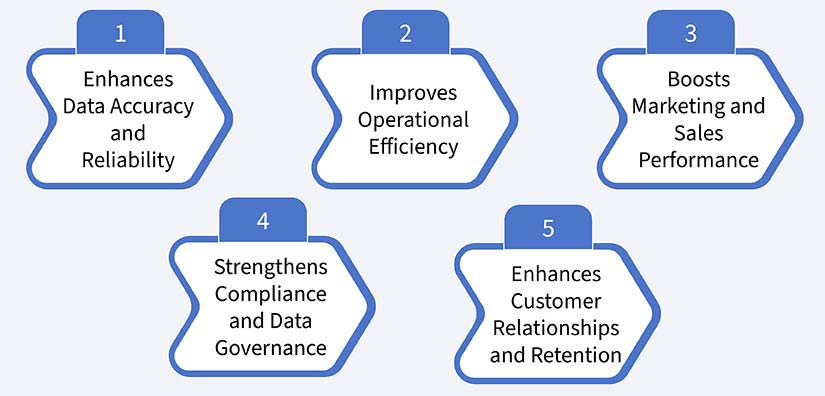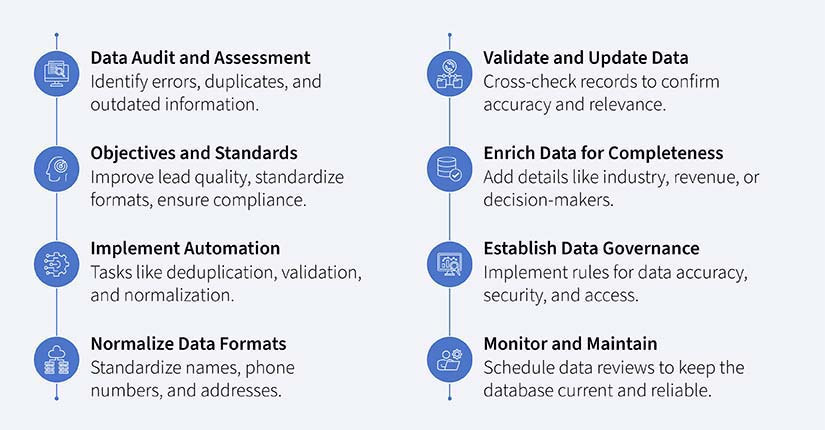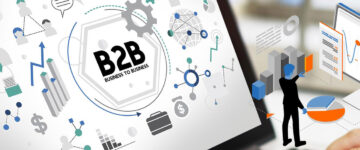- Clean and reliable data enhances decision-making, streamlines operations, and improves customer engagement, making it a cornerstone for B2B growth.
- Data cleansing enables precise targeting, reduces marketing waste, and ensures adherence to regulatory standards like GDPR and CCPA.
- Eliminating errors and redundancies optimizes workflows, supports automation, and prepares businesses for scalable growth.
Table of Contents
Data quality issues and data decay have become a major concern for B2B operations. Ignoring these issues leads to errors, loss of validity of contact databases, and unreliable analytics. Thus, B2B data cleansing has become a critical priority for modern businesses. Every technical team trying to scale data operations inevitably has to build an internal data cleansing process or engage external services.
The advantage of specialized data cleansing services is that their data quality solutions address multiple issues simultaneously – from customer data accuracy and marketing database validity to system consistency and compliance. In most cases, data cleansing service providers also offer B2B data enrichment services that go beyond the process of data cleansing per se.
To help technical teams make informed decisions about data quality management, we have discussed here five essential reasons for data cleansing in B2B companies. Our analysis draws from real implementation examples across industries, demonstrating improvements in both the technical reliability of B2B data and business outcomes.
Top 5 reasons why data cleansing is essential for B2B success
Clean data is vital to the success of B2B companies. It drives accurate insights, efficient operations and informed decisions. Adopting robust B2B data cleansing ensures sustained data quality and profitable growth. Here are five reasons why data cleansing should be a top priority for B2B companies.

1. Enhances data accuracy and reliability
The quality of your data can determine the success of your operations. Errors, outdated information, and inconsistencies within datasets often lead to missed opportunities, inefficient processes, and strained client relationships. Imagine a key email failing to reach its recipient due to a simple typo or a sales team wasting valuable time chasing duplicate leads. These issues, while seemingly small, can compound into significant losses over time.
Effective strategies for B2B data cleansing addresses these challenges by transforming disorganized, unreliable information into accurate, actionable insights. It identifies and corrects errors, consolidates duplicate records, and ensures that all entries reflect the latest and most relevant details.
Moreover, standardization is integral to ensuring that data is not just accurate but also compatible across systems. A logistics company that normalised address formats significantly improved delivery accuracy, reducing costly reroutes and enhancing customer satisfaction.
By maintaining clean and reliable data, businesses enable better decision making, seamless system integration, and more targeted marketing efforts. For B2B companies aiming to stay competitive, data cleansing isn’t just a process; it’s a strategic necessity.
2. Improves operational efficiency
For B2B companies, operational efficiency is the key to staying competitive, and clean data serves as the foundation for robust workflows and better resource management. Data riddled with errors wastes valuable time, forcing teams to reconcile inconsistencies instead of focusing on high-priority tasks. Data cleansing eliminates these inefficiencies, empowering B2B companies to operate efficiently.
For example, ongoing update and validation of over 2 million hospitality records created a high-performing database for a French data aggregator.
Clean data streamlines workflows by ensuring that systems like CRM and ERP integrate effortlessly, reducing errors and manual interventions. For example, a B2B logistics company optimized its order fulfilment process by using accurate and standardized delivery information, resulting in faster and error-free shipments.
By minimizing reworks and improving data accuracy, businesses can allocate resources more effectively. Sales teams, for instance, can focus on qualified leads instead of sorting through invalid or duplicate contacts. Clean data also supports automation, enabling repetitive tasks like lead assignments or email outreach to be handled efficiently, saving time and reducing labor costs.
Scalability is another advantage. As businesses grow, clean data ensures that systems and processes can handle increased workloads without bottlenecks. With reliable, actionable data, B2B companies improve decision-making efficiency, enabling them to act strategically in dynamic markets.
Power Your Business Decisions
Ensure your data works as hard as you do—accurate, reliable, and actionable.
3. Boosts marketing and sales campaign performance
In the world of B2B marketing and sales, the success of campaigns often hinges on the quality of data. Clean and accurate data enable businesses to precisely target and personalize their messaging, ensuring that each interaction resonates with the intended audience. For example, a B2B software provider achieved significantly higher email open rates by segmenting its leads based on industry and job roles and delivering tailored solutions that met specific needs.
Data cleansing improves lead scoring and qualification. It eliminates invalid or duplicate entries and allows teams to focus on high-potential prospects. A sales team that prioritizes clean data avoids wasting time on unqualified leads, leading to improved conversion rates and efficient sales funnel.
Up-to-date customer data further enable effective retargeting campaigns. By leveraging clean purchase histories, a B2B eCommerce platform retargeted clients with complementary product recommendations, driving repeat business, and strengthening client relationships.
Marketing wastage is another challenge addressed by data cleansing. Removing outdated or irrelevant contact details prevents resources from being squandered on dead ends. A B2B marketing agency, for instance, reduced campaign costs by ensuring that only verified contacts received communications.
Additionally, clean data synergizes with enrichment efforts, adding valuable details like company size or location to refine targeting strategies. For example, a B2B service provider used enriched, clean data to tailor its offerings to high-value accounts, boosting ROI and engagement. By maintaining accurate data, businesses can unlock the full potential of their marketing and sales strategies.
In another case CRM Database Cleansing & Enrichment for a leading video communication giant resulted in accurate customer profiles, improving database accuracy and driving enhanced sales revenue. A total of 75,000 profiles were pushed into the database every month.
4. Strengthens compliance and data governance for B2B
Compliance and data governance are critical for B2B organizations operating in a regulatory-driven environment. Clean data ensures adherence to regulations such as GDPR, CCPA, and HIPAA by maintaining accurate and up-to-date records. For example, a B2B financial services firm avoided hefty fines by ensuring client data met GDPR requirements for accuracy and transparency.
Data cleansing also mitigates privacy risks by removing outdated or sensitive information that could lead to breaches. A B2B healthcare provider, for instance, safeguarded patient data by regularly purging obsolete records, thus reducing the risk of unauthorized access.
Clean datasets simplify audits by ensuring data consistency and traceability. A B2B logistics company seamlessly passed compliance checks by presenting reliable shipment data during audits. Additionally, data cleansing aligns with governance frameworks, establishing clear policies for access and use. For example, a B2B SaaS company enhanced security by maintaining a clean and structured database that adhered to defined protocols.
Accurate data also supports consent management, ensuring compliance with data protection laws. A marketing agency avoided sending unsolicited emails by tracking updated consent records.
Finally, clean data bolsters reporting and analytics, enabling compliance-driven decisions. For instance, a B2B consulting firm used accurate financial data to generate reliable and compliant client reports. With data cleansing, businesses not only meet regulatory demands, but also build a foundation for secure, trustworthy operations.
5. Enhances customer relationships and retention for B2B
In B2B, strong customer relationships are built on trust and personalization, and clean data is the foundation. Accurate data enable tailored communications and solutions, making every interaction more meaningful. For instance, a B2B software provider used clean data to recommend customized product bundles, thereby increasing client loyalty.
Reliable data fosters trust by ensuring error-free transactions. A logistics company strengthened customer confidence by consistently delivering shipments to the correct addresses, showcasing its dependability.
Timely follow-ups are another key to retention. Up-to-date contact details allow teams to engage clients at the right time, as seen with a consulting firm that improved retention by scheduling follow-ups based on accurate calendars. Clean data enhances responsiveness, enabling faster resolutions to client inquiries. A B2B marketing agency effectively addressed customer issues with a well-organized database, boosting satisfaction.
Regular updates to customer profiles ensure consistent engagement over time. For example, a financial service provider tracked client preferences to offer relevant services, building long-term relationships.
Additionally, clean data supports loyalty programs and proactive management, such as upselling or cross-selling opportunities. A B2B e-commerce platform used enriched data to recommend complementary products, increasing customer retention and driving revenue growth.
Top benefits of data cleansing for b2b success
| Benefits to Business | How Data Cleansing Helps |
|---|---|
| Accurate communication | Corrects typos and errors for seamless client interactions. |
| Simplified record management | Removes duplicates to streamline operations. |
| Informed decision-making | Updates outdated data for better insights. |
| Operational efficiency | Standardizes formats for consistency across systems. |
| Personalized marketing | Enables precise segmentation and targeting. |
| Higher ROI | Focuses campaigns on relevant, qualified leads. |
| Regulatory compliance | Maintains accurate, secure, and compliant records. |
| Stronger client relationships | Ensures timely, personalized engagement. |
| Automation ready data | Prepares clean datasets for efficient automation. |
| Increased sales opportunities | Identifies upselling and cross-selling possibilities. |
Challenges in data cleansing operations and implementation
Data cleansing is a critical process, but its implementation often comes with challenges that can impact efficiency. Businesses handling massive datasets face the difficulty of managing high volumes of data while ensuring consistency and accuracy. Integration across multiple systems like CRM and ERP, further complicates the process, as inconsistent formats and duplicate entries demand significant resources.
Detecting and correcting errors, duplicates, or outdated information require advanced tools and expertise that many organizations may not have in-house. Additionally, keeping data updated in fast-changing environments, such as customer or supplier databases, can be time-consuming and costly.
Regulatory compliance adds another layer of complexity, as businesses must ensure their data aligns with stringent standards like GDPR and CCPA. These challenges underscore the need for a robust strategy to ensure clean, reliable data that supports business growth and decision making.
Why outsourcing data cleansing is the solution
Outsourcing data cleansing offers a smart and efficient way to overcome operational challenges. Service providers bring specialized expertise, cutting-edge technology, and proven methodologies to handle even the most complex data requirements. This ensures errors are identified, duplicates removed, and records updated with precision.
Scalability is another key advantage. Businesses can manage fluctuating data volumes or seasonal demands without overburdening their internal teams. By outsourcing, companies can also significantly save on costs associated with infrastructure, tools, and in-house expertise.
Moreover, professional providers ensure strict adherence to compliance standards, reducing the risk of regulatory penalties. Outsourcing frees internal resources, allowing teams to focus on strategic initiatives while maintaining clean, actionable data that drives operational success and better decision-making.
How to implement an effective data cleansing process

Conclusion
Implementing systematic b2b data cleansing delivers tangible results across enterprise functions, from streamlined workflows and reduced error rates to improved compliance standards. As data volumes and complexity grow, organizations partnering with data cleansing services gain the advantage of maintaining high-quality data without straining internal resources.
Evidence from successful implementations shows that clean, reliable data directly impacts bottom-line results through better decision making, efficient operations, and stronger customer relationships. By treating data quality as an ongoing priority rather than as a one-time fix, B2B organizations create sustainable frameworks for data management that support long-term business objectives.
Organizations that act now to establish robust data quality processes position themselves to leverage data assets effectively, turning quality data into measurable business value.
Streamline B2B Operations
Eliminate inefficiencies and focus on growth with clean data.







